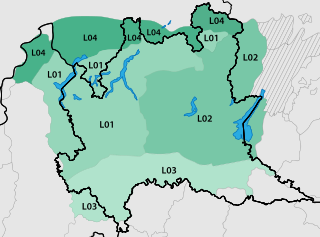
The Lombard language belongs to the Gallo-Italic group within the Romance languages and is characterized by a Celtic linguistic substratum and a Lombardic linguistic superstratum and is a cluster of homogeneous dialects that are spoken by millions of speakers in Northern Italy and southern Switzerland, including most of Lombardy and some areas of the neighbouring regions, notably the far eastern side of Piedmont and the extreme western side of Trentino, and in Switzerland in the cantons of Ticino and Graubünden. The language is also spoken in Santa Catarina in Brazil by Lombard immigrants from the Province of Bergamo, in Italy.
Milanese is the central variety of the Western dialect of the Lombard language spoken in Milan, the rest of its metropolitan city, and the northernmost part of the province of Pavia. Milanese, due to the importance of Milan, the largest city in Lombardy, is considered one of the most prestigious Lombard variants and the most prestigious one in the Western Lombard area.

The province of Como is a province in the Lombardy region of Italy. It borders the Swiss cantons of Ticino and Grigioni to the north, the Italian provinces of Sondrio and Lecco to the East, the province of Monza and Brianza to the south and the province of Varese to the West. The city of Como is its capital—other large towns, with more than 10,000 inhabitants, include Cantù, Erba, Mariano Comense and Olgiate Comasco. Campione d'Italia also belongs to the province and is enclaved in the Swiss canton of Ticino.

The province of Lecco is a province in the Lombardy region of Italy. Its capital is the city of Lecco.
The Ticinese dialect is the set of dialects, belonging to the Alpine and Western branch of the Lombard language, spoken in the northern part of the Canton of Ticino (Sopraceneri); the dialects of the region can generally vary from valley to valley, often even between single localities, while retaining the mutual intelligibility that is typical of the Lombard linguistic continuum.

The Gallo-Italic, Gallo-Italian, Gallo-Cisalpine or simply Cisalpine languages constitute the majority of the Romance languages of northern Italy: Piedmontese, Lombard, Emilian, Ligurian, and Romagnol. In central Italy they are spoken in the northern Marches ; in southern Italy in some language islands in Basilicata and Sicily.
Western Lombard is a group of dialects of Lombard, a Romance language spoken in Italy. It is widespread in the Lombard provinces of Milan, Monza, Varese, Como, Lecco, Sondrio, a small part of Cremona, Lodi and Pavia, and the Piedmont provinces of Novara, Verbano-Cusio-Ossola, the eastern part of the Province of Alessandria (Tortona), a small part of Vercelli (Valsesia), and Switzerland. After the name of the region involved, land of the former Duchy of Milan, this language is often referred to as Insubric or Milanese, or, after Clemente Merlo, Cisabduano.

Lomazzo is a town and comune in the province of Como, in the Italian region of Lombardy. It is situated halfway between Como and Milan. The ancient historical center of the town was founded on the top of a hill situated in the valley on the right bank of Lura. The municipal territory contains a large portion of the Lura Park. Lomazzo received the title of Città (City) with a presidential decree on July 11, 2006. Lomazzo borders the following municipalities: Bregnano, Cadorago, Cirimido, Guanzate, Rovellasca, Rovello Porro, Turate.

Perledo is a comune (municipality) in the Province of Lecco in the Italian region Lombardy, located about 60 kilometres (37 mi) north of Milan and about 20 kilometres (12 mi) northwest of Lecco. As of 31 December 2004, it had a population of 900 and an area of 12.5 square kilometres (4.8 sq mi).

Varenna is a comune (municipality) on Lake Como in the Province of Lecco in the Italian region of Lombardy, located about 60 kilometres (37 mi) north of Milan and about 20 kilometres (12 mi) northwest of Lecco.
Canzés is a variety of Brianzöö spoken in the commune of Canzo, Italy.
Bustocco and Legnanese are two dialects of Western Lombard, spoken respectively in the cities of Busto Arsizio and Legnano, Lombardy.
Vallassinese is variety of the Western Lombard language spoken in the Vallassina valley of Italy. It belongs to the Comasco-Lecchese group and it has many subdialects.
Novarese, locally pronounced Nuares, is a dialect of the Western Lombard language spoken in the province of Novara (Piedmont).

Cremonese (Cremunés) is a dialect of the Western Lombard dialect group spoken in the city and province of Cremona in Lombardy, Italy, with the exception of Crema and the area of Soresina, where an Eastern Lombard dialect is spoken, and the area of Casalmaggiore, where a form of Emilian closely related to Parmigiano is spoken.
Southwestern Lombard is a group of dialects of Western Lombard language spoken in the provinces of Pavia, Lodi, Novara, Cremona, in the south of the historic Insubria, and comprises Pavese, Ludesan, Novarese, Cremunés and others.
Lecchese is a dialect of Western Lombard language spoken in the city and suburbs of Lecco (Lombardy).
Comasco or Comasque is a dialect belonging to the Western branch of Lombard language, spoken in the city and suburbs of Como. Comasco is part of the Comasco-Lecchese dialect group.
Laghée is a dialect of Western Lombard language spoken in the north of province of Como (Lombardy), on the coast of the eponymous lake.
Pavese is a dialect of Western Lombard language spoken in province of Pavia (Lombardy). In Pavese, differently from most of Western Lombard dialects, the "z" is transformed into "s".







